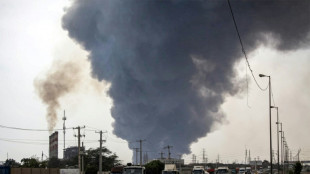
-
 Turkey's opposition says Erdogan's canal plan behind latest arrests
Turkey's opposition says Erdogan's canal plan behind latest arrests
-
Maresca hails 'nasty' Chelsea as top five bid stays alive

-
 Trump raises Putin doubts after Zelensky talks at pope's funeral
Trump raises Putin doubts after Zelensky talks at pope's funeral
-
Major blast at Iran port kills 4, injures hundreds

-
 Napoleon's sword to be sold at auction in Paris
Napoleon's sword to be sold at auction in Paris
-
Iran, US discuss nuclear deal in third round of talks

-
 Buenos Aires farewells native pontiff with call to action
Buenos Aires farewells native pontiff with call to action
-
Warholm sets hurdles world record at Diamond League, Holloway shocked

-
 US students 'race' sperm in reproductive health stunt
US students 'race' sperm in reproductive health stunt
-
Wikileaks founder Assange joins crowds for pope funeral

-
 Leader Marc Marquez claims Spanish MotoGP sprint victory
Leader Marc Marquez claims Spanish MotoGP sprint victory
-
Celtic win fourth successive Scottish Premiership title

-
 Jackson ends drought as Chelsea boost top five push
Jackson ends drought as Chelsea boost top five push
-
Warholm sets 300m hurdles world record in Diamond League opener

-
 Major blast at south Iran port kills 4, injures hundreds
Major blast at south Iran port kills 4, injures hundreds
-
Russia says retook Kursk from Ukraine with North Korean help

-
 Francis laid to rest as 400,000 mourn pope 'with an open heart'
Francis laid to rest as 400,000 mourn pope 'with an open heart'
-
Trump, Zelensky meet on sidelines of pope's funeral

-
 'Shared loss': Filipino Catholics bid Pope Francis farewell
'Shared loss': Filipino Catholics bid Pope Francis farewell
-
Families unable to reunite as India-Pakistan border slams shut

-
 Major blast at south Iran port injures hundreds
Major blast at south Iran port injures hundreds
-
Foreign carmakers strive for 'China Speed' to stay in race

-
 Pakistan says open to neutral probe into Kashmir attack after India threats
Pakistan says open to neutral probe into Kashmir attack after India threats
-
Hundreds of thousands at funeral mourn pope 'with an open heart'

-
 Quartararo sets Spanish MotoGP record to claim pole
Quartararo sets Spanish MotoGP record to claim pole
-
Hamas says open to 5-year Gaza truce, one-time hostages release

-
 Iran, US hold new round of high-stakes nuclear talks
Iran, US hold new round of high-stakes nuclear talks
-
Up at dawn for front-row seat to history at Francis's funeral

-
 Pakistan ready to 'defend sovereignty' after India threats
Pakistan ready to 'defend sovereignty' after India threats
-
Huge crowds flock to Vatican for Pope Francis's funeral

-
 Xi says China must 'overcome' AI chip challenges
Xi says China must 'overcome' AI chip challenges
-
Indian army says new exchange of gunfire with Pakistan

-
 Epstein accuser Virginia Giuffre takes own life in Australia: family
Epstein accuser Virginia Giuffre takes own life in Australia: family
-
Hundreds of buildings damaged, dozens injured in 6.3 Ecuador quake

-
 India and Pakistan's Kashmir fallout hits economy too
India and Pakistan's Kashmir fallout hits economy too
-
Francis's funeral to be grand farewell to 'pope of the poor'

-
 Pogacar faces defiant Evenepoel at Liege-Bastogne-Liege
Pogacar faces defiant Evenepoel at Liege-Bastogne-Liege
-
Chelsea eye great escape against Barcelona in Women's Champions League

-
 Iran, US to hold new round of high-level nuclear talks
Iran, US to hold new round of high-level nuclear talks
-
'Energy and effort' pay off for Reds as Blues' woes continue

-
 Albatross and closing birdie lift China's Liu to LPGA Chevron lead
Albatross and closing birdie lift China's Liu to LPGA Chevron lead
-
On the horizon? Wave of momentum for high seas treaty

-
 New to The Street Launches For The Causes(TM) Monthly Awareness Segments: Offering Free National Media to Charities and Organizations
New to The Street Launches For The Causes(TM) Monthly Awareness Segments: Offering Free National Media to Charities and Organizations
-
Top Mistakes to Avoid When Building Credit History

-
 Developing countries should fast-track US trade deals: World Bank president
Developing countries should fast-track US trade deals: World Bank president
-
Grizzlies' Morant 'doubtful' for must-win game 4 v Thunder

-
 Trump in Rome for pope funeral in first foreign trip of new term
Trump in Rome for pope funeral in first foreign trip of new term
-
Trump says Russia-Ukraine deal 'very close' after new Kremlin talks

-
 US rookies lead PGA pairs event with McIlroy and Lowry in hunt
US rookies lead PGA pairs event with McIlroy and Lowry in hunt
-
Trump tariff promises get a reality check


Current carbon dioxide levels last seen 14 million years ago
The last time carbon dioxide in the atmosphere consistently matched today's human-driven levels was 14 million years ago, according to a large new study Thursday that paints a grim picture of where Earth's climate is headed.
Published in the journal Science, the paper covers the period from 66 million years ago until the present, analyzing biological and geochemical signatures from the deep past to reconstruct the historic CO2 record with greater precision than ever before.
"It really brings it home to us that what we are doing is very, very unusual in Earth's history," lead author Baerbel Hoenisch of the Columbia Climate School's Lamont-Doherty Earth Observatory told AFP.
Among other things, the new analysis finds the last time the air contained 420 parts per million (ppm) of carbon dioxide was between 14-16 million years ago, when there was no ice in Greenland and the ancestors of humans were just transitioning from forests to grasslands.
That is far further back in time than the 3-5 million years that prior analyses have indicated.
Until the late 1700s, atmospheric carbon dioxide was about 280 ppm, meaning humans have already caused an increase of about 50 percent of the greenhouse gas, which traps heat in the atmosphere and has warmed the planet by 1.2 degrees Celsius compared to before industrialization.
"What's important is that Homo, our species, has only evolved 3 million years ago," said Hoenisch.
"And so our civilization is tuned to sea level as it is today, to having warm tropics and cool poles and temperate regions that have a lot of rainfall."
If global CO2 emissions continue to rise we could reach between 600 - 800 ppm by the year 2100.
Those levels were last seen during the Eocene, 30-40 million years ago, before Antarctica was covered in ice and when the world's flora and fauna looked vastly different -- for example huge insects still roamed the Earth.
- Ancient plants -
The new study is the product of seven years of work by a consortium of 80 researchers across 16 countries and is now considered the updated consensus of the scientific community.
The team didn't collect new data -- rather, they synthesized, re-evaluated and validated published work based on updated science and categorized them according to confidence level, then combined the highest-rated into a new timeline.
Many people are familiar with the concept of drilling into ice sheets or glaciers to extract ice cores whose air bubbles reveal past atmospheric composition -- but these only go back so far, generally hundreds of thousands of years.
To look further into the past, paleoclimatologists use "proxies": by studying the chemical composition of ancient leaves, minerals and plankton, they can indirectly derive atmospheric carbon at a given point in time.
The researchers confirmed that the hottest period over the past 66 million years happened 50 million years ago, when CO2 spiked to as much as 1,600 ppm and temperatures were 12C hotter, before a long decline set in.
By 2.5 million years ago, carbon dioxide was 270-280 ppm, ushering in a series of ice ages.
That remained the level when modern humans arrived 400,000 years ago and persisted until our species began burning fossil fuels at large scales.
The team estimates that a doubling of CO2 is predicted to warm the planet by 5-8 degrees Celsius -- but over a long period, hundreds of thousands of years -- when increased temperatures have rippling effects through Earth systems.
For example, melting the polar ice caps would reduce the planet's ability to reflect solar radiation and become a reinforcing feedback loop.
But the new work remains directly relevant to policy makers, stressed Hoenisch.
The carbon record reveals that 56 million years ago, Earth underwent a similar rapid release of carbon dioxide, which caused massive changes to ecosystems and took some 150,000 years to dissipate.
"We are in this for a very long time, unless we sequester carbon dioxide, take it out of the atmosphere, and we stop our emissions sometime soon," she said.
M.Thompson--AMWN



